

How To Think Clearly With The Top 11 Best Online Critical Thinking Courses & Classes [Free Guide]

Looking for a game-changer in the way you think about the world around you? Well, you’re exactly where you need to be to get started!
In this guide, I cover some of the best online critical thinking courses for developing your skills. With courses ranging from under an hour in length to 16-week programs, there’s something for everyone.
Also, all of these online courses will equip you with the tools and techniques you need to become a great critical thinker, so let’s get into them!
Table of Contents
Top 11 Best Online Critical Thinking Courses & Classes 2025
1. how to think differently & critically (skillshare).
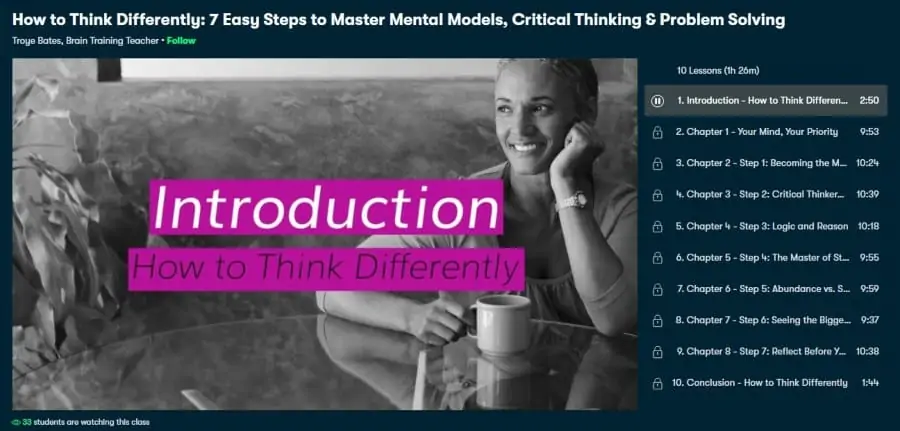
In 7 easy steps, this online critical thinking course, for beginners and advanced thinkers alike, will help you see the world differently by examining different perspectives and using logic and critical reasoning to expand your mind.
Troye Bates is your instructor for this course online class, who writes a popular online blog on brain-training, and began teaching several years ago, sparked by his passion for enhancing our mental capabilities.
Through the 7-step process, students learn how to become a mental master of critical thinking, logic, and reasoning, strategy, abundance, big-picture thinking, reflecting before they act, and tons more!
Global online learning platform Skillshare is where you will find this online course. There are over 29,000 other courses available on the platform and you even get a 1-month free trial! Overall, this is one of the best critical thinking classes you can find online!
- 10 video lessons
- 1 hour and 26 minutes of content
- 271 students have taken the course
- Suited to all levels
Activate FREE Skillshare Trial
2. Critical Thinking: How to Find Out What Really Works (Skillshare)
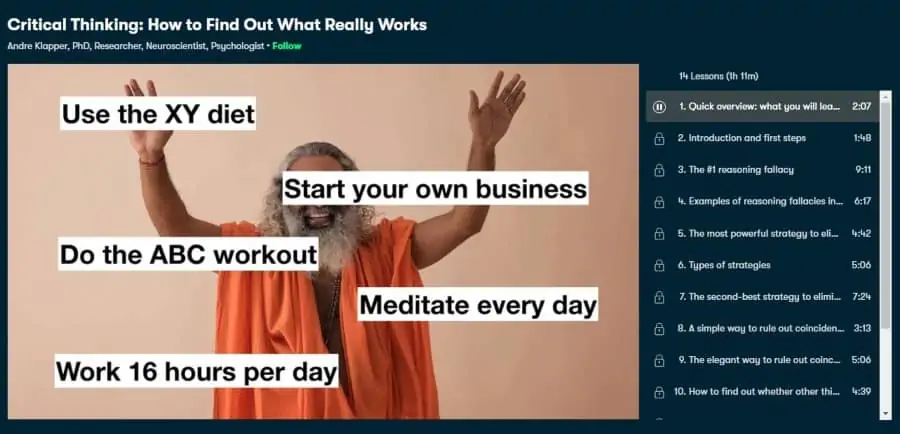
Keen to level-up your critical thinking skills at work, school, or in day-to-day life? Critical thinking is an essential life skill, and this online course teaches you key strategies to make better life decisions.
Andre Klapper , Ph.D., is your teacher, who is a researcher, psychologist, and neuroscientist with decades of experience in working with the mind and understanding cognitive processes. This is also 1 of 9 courses Andre currently has on Skillshare.
Spread across 14 lessons over 1-hour, students will learn the reasoning fallacy, everyday examples, how to eliminate alternative explanations, how to rule out coincidences, how to draw conclusions efficiently, the scientific thinking blueprint, and tons more!
Currently, you can find this online course hosted on the global online learning platform, Skillshare. There are over 29,000 other courses available on the platform, plus you get a 1-month free trial as a new user! Overall, this is a great introductory class to enroll in.
- 14 video lessons
- 1 hour and 11 minutes
- 211 students have taken the course
- Suited to beginners
3. Welcome to critical thinking (LinkedIn Learning)
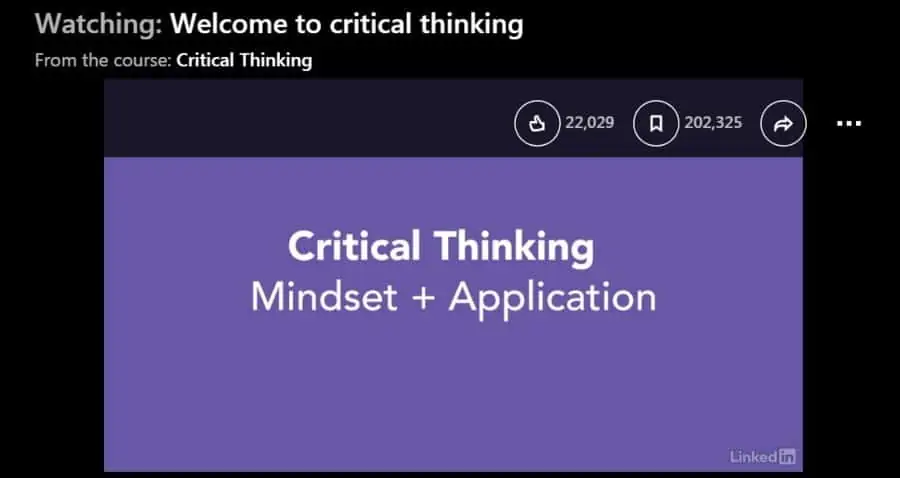
Learn how to make more thoughtful and effective decisions in every area of your life with this online critical-thinking course designed to challenge and expand your current level of thinking. Clocking in at an hour, this introductory critical thinking course is just the right length to get some learning in on your commute or while out for a run!
Leading this online course is Mike Figliuolo , the Managing Director of Thought LEADERS LLC, and an author at LinkedIn Learning. Mike is also a nationally renowned speaker, blogger, author, and teacher.
Throughout the course’s one-hour running time, students explore a series of techniques to assist with developing critical thinking skills by sharing how to redefine problems and use specific strategies such as the ‘5 Whys’, the ‘7 So Whats’, and the 80/20 rule.
You can find this online critical thinking course hosted on LinkedIn Learning, offering over 150,000 courses on a range of topics, all available to students worldwide! The expert teaching and quality content make this a not-to-miss online course!
- Approx. 1 hour of content
- Downloadable on Apple and GooglePlay for offline learning
- 312,745 people have viewed the course
Visit LinkedIn.con
4. Critical Thinking In The Workplace (Skillshare)
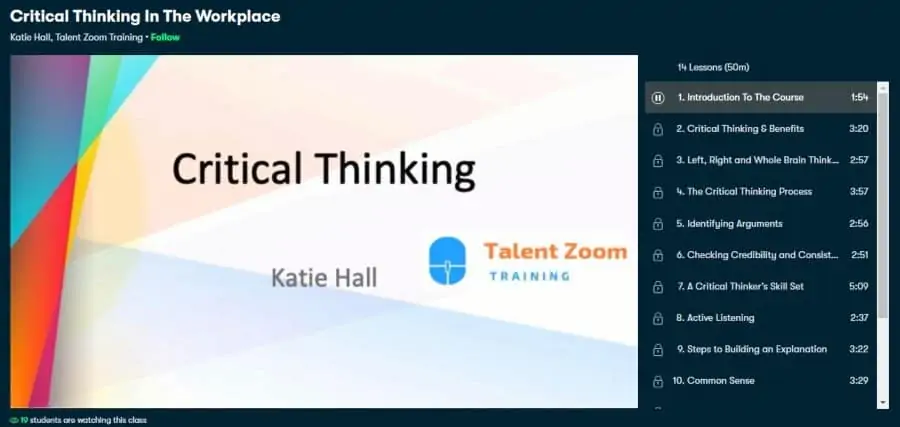
Next up on my list is a critical-thinking course designed specifically for the workplace. Whether you’re looking to enhance your own skills, or you’re a manager or CEO aiming to increase staff productivity, this short 50-minute course is highly recommended.
Katie Hall is your instructor, a representative of Talent Zoom, which is a company that helps businesses identify their unique workplace talents. Katie also has 3 courses on Skillshare and is dedicated to helping people succeed in their professional lives.
Some of the many topics covered in this online critical thinking course include the foundations of critical thinking, as well as understanding left, right, whole-brain thinking, consistency of ideas, building an explanation, active listening, and tons more!
For those interested, this online course is hosted on the global online learning platform, Skillshare. There are over 29,000 other courses available on the platform, plus a 1-month free trial! Overall, this is one of the best online critical thinking classes out there!
- 50 minutes of content
- 429 students have taken the course
- 2 downloadable resources
5. Critical Thinking for Better Judgment and Decision-Making (Skillshare)
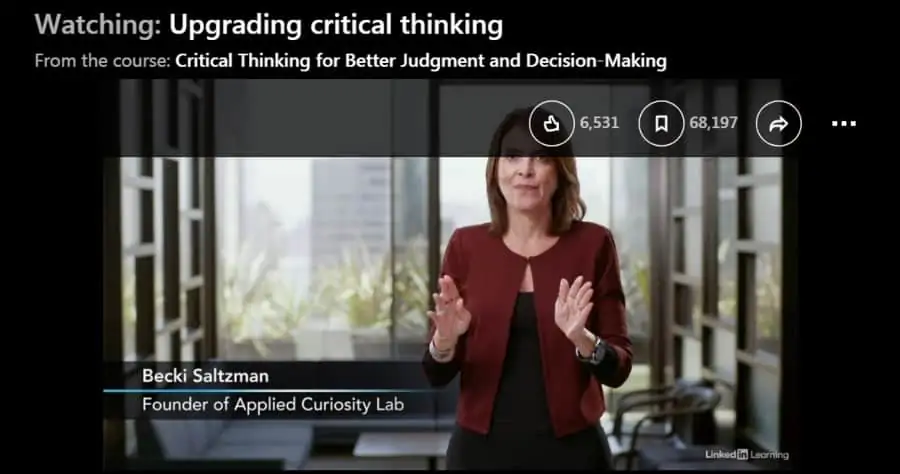
Did you know that having solid critical-thinking skills leads to better decision-making and a higher quality of life as a result? This online course empowers you to make the right decisions for your life by teaching you objective and rational analysis techniques to apply to any situation you might find yourself in.
Taught by Becki Saltzman , this class is expertly led in short-format video lectures. Becki is an author, speaker, and founder of the Applied Curiosity Lab. She is focused on teaching skills to companies to improve their operations, and how their teams innovate, tackle challenges, and respond to change.
Each module of this critical thinking course covers topics such as the foundational aspect of critical thinking, how to minimize bad judgment, improving vision quality, and creating a culture of curiosity.
Hosted on LinkedIn Learning, you can access this course and then choose from more than 150,000 others taught by industry experts once you’ve completed it! Definitely a recommended short class that you can access from anywhere.
- Approx. 55 minutes of content
- 78,641 people have viewed the course
- Suited to advanced level
6. Master Cognitive Biases and Improve Your Critical Thinking (Udemy)
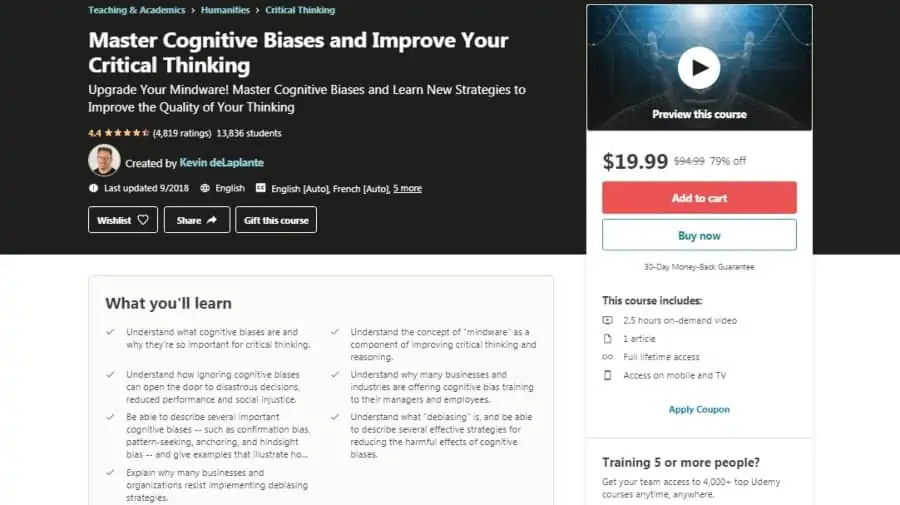
My next standout pick is an online critical-thinking course to fast-track your mental upgrade. Master your understanding of cognitive biases and learn the most effective strategies to improve the quality of your thinking in just under 2.5 hours!
Kevin DeLaplante Ph.D. is your course instructor, who is a philosopher and the founder of the Critical Thinker Academy. Kevin has taught more than 62,000 students in his 4 online courses on Udemy and works with groups, universities, and in 1-1 coaching for improving critical thinking.
In over 50 von-demand video lectures, students are guided through an explanation of cognitive bias is and how it relates to critical thinking. Lessons include confirmation bias, pattern-seeking, hindsight bias, and the anchoring effect, ending with some helpful strategies for debasing ideas.
Udemy is where you can access this critical thinking course, a great online course platform that offers its students over 150,000 on-demand online courses from beginner to advanced level!
- 50 video lectures
- 2 hours and 26 minutes of content
- Lifetime access
- Certificate of Completion
- 4.4/5 from 4,812 ratings
- 13,803 students have taken the course
Visit Udemy.com
7. Teaching Critical Thinking through Art with the National Gallery of Art (edX)
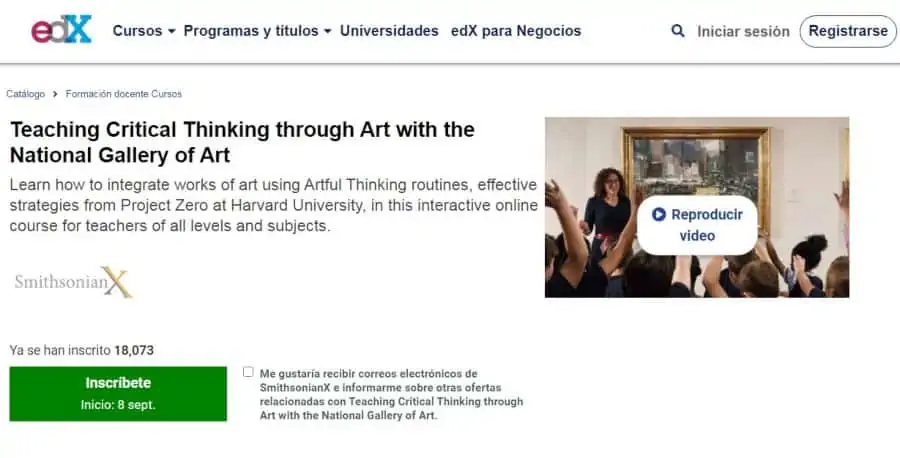
Are you an artist or an art enthusiast? Next up is a specialist online course examining critical thinking through an artistic lens. You’ll learn how to strengthen your thinking and facilitate meaningful conversations by applying artistic critical-thinking techniques.
As for your instructor, this online critical thinking course is offered by The Smithsonian Institute with Julie Carmean , the Museum Educator and Coordinator of Professional Development at The National Gallery of Art in Washington, United States, as your leading you.
Through 4 content units, which will take up to 20 hours to complete via self-paced learning, students investigate thinking routines, observing and describing tactics, reasoning with evidence, and questioning and investigating, receiving downloadable artful thinking lesson plans as a bonus!
You can find this online critical thinking course can be found on the nonprofit education platform edX, founded by Harvard and MIT, and offering courses form the leading worldwide universities to more than 20 million students! This particular course is one of the best online critical thinking classes I’ve found.
- 18,073 students have enrolled
- Takes 16 weeks to complete
- 3-4 hours a week of work
- Great for all levels
Visit edX.org
8. Master your Decision-Making, and Critical Thinking Skills (Udemy)
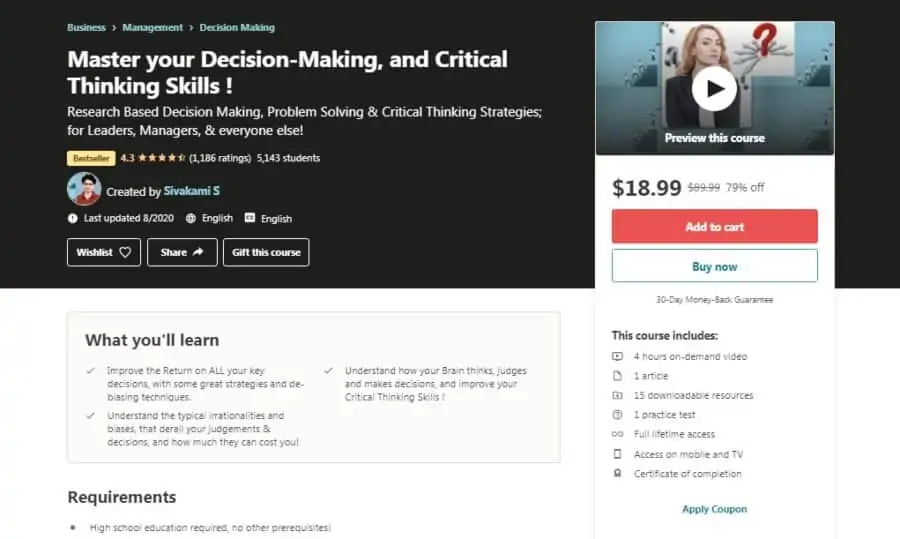
Are you looking for a comprehensive online course to improve your decision-making? You can work towards mastering good decision-making in this 4-hour online critical-thinking course that comes highly recommended with a 4.4/5 rating!
Your course instructor is Sivakami S , an experienced business leader and research/doctoral scholar who has taught over 20,000 students in his 12 online courses on Udemy. With nearly 2 decades of experience, she has led many initiatives in large corporations such as Verizon and Microsoft.
Spanning 45 video lectures presented in just over 4 hours, students learn how humans think, judge, and decide key cognitive biases, irrationality versus rationality, de-biasing techniques, logical fallacies, and so much more.
Head to Udemy to check this course out, a global online learning platform that offers more than 150,000 on-demand courses on a whole range of topics no matter your level! Overall, this online course is a great deep-dive into critical-thinking!.
- 45 video lectures
- 4 hours and 3 minutes of content
- 4.4/5 from 1,183 ratings
- 5,129 students have taken the course
- 15 downloadable resources
9. Philosophy and Critical Thinking (edX)
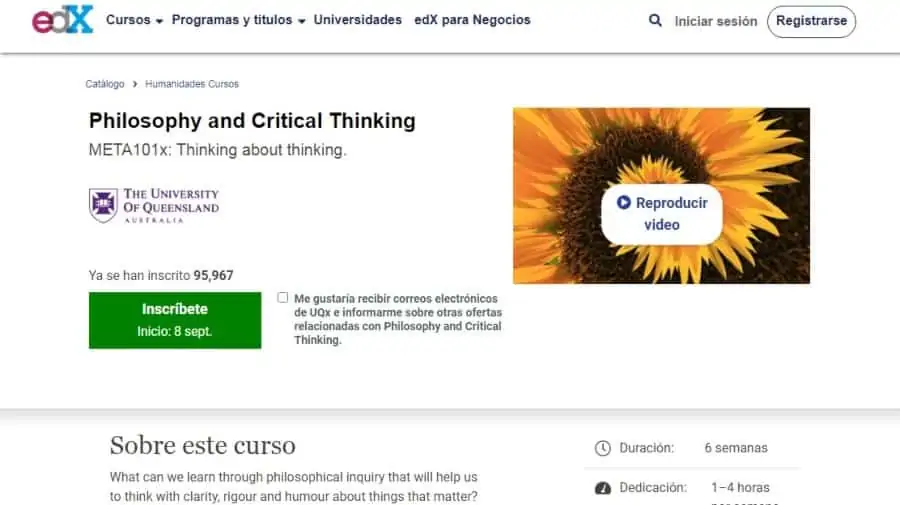
Another online critical thinking course that I’m excited to show you is a totally free, university-led offering for anyone who wants to improve their critical thinking skills. Over a period of 6 weeks, students learn how to use philosophical inquiry to improve your personal and professional decision-making.
Two instructors share the teaching of this online course, Professor Deborah Brown and Dr. Peter Ellerton , both lecturers and Directors of the University of Queensland Critical Thinking Project who
Students are led through critical thinking content that teaches them how to identify, analyze, and construct cogent arguments, and how to think of solutions to the central philosophical problems. There is also an option to add a verified certificate for an extra fee, for students looking for this proof of completion of the course.
edX hosts this online critical thinking course, offering more than 20 million students incredible access to online courses at leading universities across the globe. Plus, as a nonprofit, it’s totally free! Overall, a high-quality course for anyone wanting to develop critical thinking.
- 95,967 students have enrolled
- 6 weeks long
- 1-4 hours of work per week
10. Critical Thinking (Udemy)
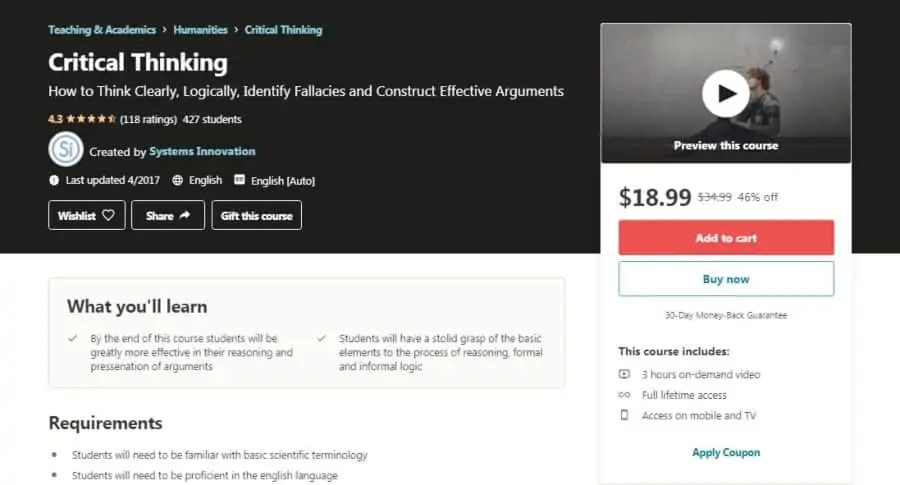
If you’re keen to study an online critical thinking course that’s both broad and detailed, this could be the one for you! In just 3 hours, you’ll have a greater grasp of logic and reasoning to apply to every area of your life.
Presented by Joss Colchester of Systems Innovation , an eLearning platform that is focused on complex systems and system change, this course is an entry into this subject. This course is led in an accessible way, making complex ideas feel easy to understand.
Joss takes students through course content covering cognition, including evolutionary psychology, as well as informal and formal logic examples and explanations, the different types of reasoning, the elements of reasoning, and argumentation rules and strategies.
One of the best online critical thinking courses around, you can find it on Udemy, which offers its students over 150,000 on-demand online courses on critical thinking and more, from beginner to advanced level!
- 21 video lectures
- 3 hours and 5 minutes of content
- 4.3/5 from 118 ratings
- 427 students have taken the course
11. Introduction to Critical Thinking (Udemy)
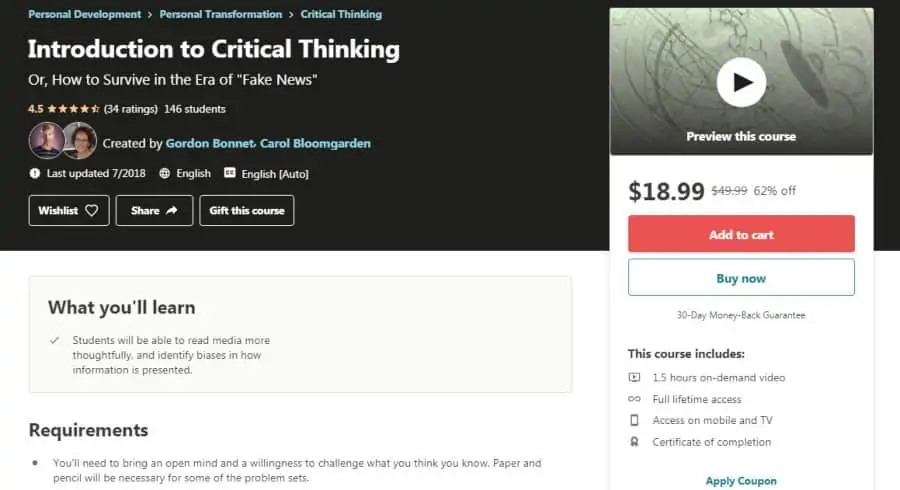
If you’re a critical-thinking newbie looking to get your decision-making off to a good start, this is a brilliant beginner’s course to help you process information and make thoughtful decisions.
Teaching duo Gorden Bonne t and Carol Bloomgarden are your instructors. Golden is the author of the blog Skeptophilio, which looks at science and media through a skeptical lens. He is also a novelist and teacher of critical thinking, and various other science topics. Carol is Gorden’s wife, and she is responsible for the video production and graphic design at Skeptophilia. They both lead this course with patience and passion.
Throughout 39 on-demand video lectures, students will explore the fundamentals of critical thinking, skepticism, learn how to recognize fallacies in the media, identify questionable statistics, construct arguments, and know when scientific terms are not being used correctly.
Udemy is where you will find this critical thinking hosted, a great online course platform which offers its students over 150,000 on-demand online courses from beginner to advanced level!
Udemy was founded in 2010 and has risen to the forefront of online learning in just a decade, to become the leader in skill-based and professional online education. To learn more, also check out my other posts on NLP and CBT !
- 39 video lectures
- 1 hour and 19 minutes of content
- Course: Introduction to Critical Thinking
- 4.5/5 from 34 ratings
- 46 students have taken the course
My name is Lewis Keegan and I am the writer and editor of SkillScouter.com. I'm extremely passionate about online education and what it can do for those to better their lives. I spend most of my time blogging, hiking, and drinking coffee. I also have a Bachelor's Degree in Education and Teaching.
- For Individuals
- For Businesses
- For Universities
- For Governments
- Online Degrees
- Join for Free

Critical Thinking: A Brain-Based Guide for the ChatGPT Era Specialization
Enhance Critical Thinking with Neuroscience and AI. Master neuroscience-based techniques and AI insights to strengthen your critical thinking and decision-making skills.

Instructors: Dr. Terrence Sejnowski +2 more
Instructors
Top Instructor
Financial aid available

(47 reviews)
Recommended experience
Beginner level
Ideal for professionals and learners interested in enhancing critical thinking. No prior neuroscience or AI knowledge required.
What you'll learn
Explore how your brain’s networks influence reasoning, including deductive, inductive, and abductive thinking.
Identify and manage biases to enhance everyday decision-making and problem-solving skills.
Skills you'll gain
- Decision-Making
- Analytical Thinking
- Problem-Solving Skills
- Logical Reasoning
- Cognitive Bias Recognition
- Decision-making
- Critical Thinking Skills
- Neuroscience of Decision Making
Details to know

Add to your LinkedIn profile
September 2024
See how employees at top companies are mastering in-demand skills

Advance your subject-matter expertise
- Learn in-demand skills from university and industry experts
- Master a subject or tool with hands-on projects
- Develop a deep understanding of key concepts
- Earn a career certificate from Deep Teaching Solutions

Earn a career certificate
Add this credential to your LinkedIn profile, resume, or CV
Share it on social media and in your performance review

Specialization - 4 course series
This Specialization is designed for professionals, educators, and lifelong learners seeking to enhance their critical thinking skills through neuroscience-based strategies. Across four courses, you will explore how the brain influences decision-making, uncover cognitive biases, and learn practical techniques to improve reasoning and problem-solving. This Specialization equips you with advanced critical thinking skills applicable in both personal and professional contexts.
Applied Learning Project
Apply neuroscience-based critical thinking techniques to analyze real-world scenarios, allowing you to identify cognitive biases and improve decision-making processes in professional or personal contexts.
Create personalized strategies using course insights to enhance your problem-solving skills, helping you make more informed and rational decisions in complex situations.
Critical Thinking for Better Decisions in the ChatGPT Era
How to recognize and overcome unconscious biases in decision-making
Techniques for balancing intuitive "gut feelings" with logical analysis
How to detect emotional influences on thinking in yourself and others
Think Critically: Deductive Reasoning and Mental Models
Apply principles of deductive reasoning to analyze arguments.
Identify how mental models and cognitive biases affect critical thinking.
Evaluate the strengths and limitations of different logical approaches, including classical and non-classical logics.
Critical Thinking & Logic: Real-World Skills
Analyze complex real-world arguments by learning to identify premises, conclusions, and argument markers in everyday contexts.
Apply inductive, deductive, and abductive reasoning to develop structured thinking and generate plausible explanations for observed phenomena.
Evaluate missing information and rhetorical techniques to assess the strength and validity of arguments in real-world scenarios.
Rethinking Logic: Surprising Science of Critical Thinking
Identify and understand logical fallacies such as circular reasoning and fallacies of relevance, and how they impact argument strength.
Recognize the influence of cognitive biases like confirmation bias and my-side bias on decision-making and reasoning processes.
Explore how social dynamics shape reasoning, revealing how reasoning improves through dialogue, debate, and social interaction.

Deep Teaching Solutions, LLC is a team that produces high-quality educational materials with the latest insights from neuroscience.
Why people choose Coursera for their career

New to Business Essentials? Start here.

Open new doors with Coursera Plus
Unlimited access to 10,000+ world-class courses, hands-on projects, and job-ready certificate programs - all included in your subscription

Advance your career with an online degree
Earn a degree from world-class universities - 100% online
Join over 3,400 global companies that choose Coursera for Business
Upskill your employees to excel in the digital economy
Frequently asked questions
How long does it take to complete the specialization.
This Specialization has four courses, each containing two modules. A reasonable pace is to do one module per week for eight weeks (two months). You can safely consider two to three hours per week as a doable timeframe.
What background knowledge is necessary?
No particular background is needed to complete this specialization
Do I need to take the courses in a specific order?
It's recommended, but not mandatory, to take the courses in the order:
Critical Thinking for Better Decisions in the ChatGPT Era Opens in a new tab
Think Critically: Deductive Reasoning and Mental Models Opens in a new tab
Critical Thinking & Logic: Real-World Skills Opens in a new tab Opens in a new tab
Rethinking Logic: Surprising Science of Critical Thinking Opens in a new tab
Will I earn university credit for completing the Specialization?
Although you will not earn university credit for completing the Specialization, you may be able to obtain continuing education credits by following the instructions within each of the courses. You will find that this Specialization will give you background information that can help provide a solid foundation for any career involving teaching that you may wish to undertake.
What will I be able to do upon completing the Specialization?
After completing the "Critical Thinking: A Brain-Based Guide for the ChatGPT Era" specialization, you will be equipped with powerful tools to navigate the complexities of modern reasoning and decision-making. You'll gain the ability to recognize and apply different types of reasoning, from deductive to abductive, in various real-world contexts. This course will sharpen your skills in analyzing arguments, identifying logical fallacies, and overcoming cognitive biases that often cloud judgment. You'll understand the neural underpinnings of critical thinking, allowing you to better leverage both fast intuitive and slow deliberative thinking processes. The specialization will cultivate your "scout mindset," enabling you to approach problems with intellectual curiosity and openness. You'll learn to evaluate information more objectively, considering multiple perspectives and questioning assumptions. Importantly, you'll develop strategies to combat confirmation bias and actively seek out diverse viewpoints. This comprehensive training will enhance your ability to think critically in both personal and professional spheres, preparing you to tackle the unique challenges and opportunities presented by artificial intelligence and large language models in our rapidly evolving digital landscape.
Is this course really 100% online? Do I need to attend any classes in person?
This course is completely online, so there’s no need to show up to a classroom in person. You can access your lectures, readings and assignments anytime and anywhere via the web or your mobile device.
What is the refund policy?
If you subscribed, you get a 7-day free trial during which you can cancel at no penalty. After that, we don’t give refunds, but you can cancel your subscription at any time. See our full refund policy Opens in a new tab .
Can I just enroll in a single course?
Yes! To get started, click the course card that interests you and enroll. You can enroll and complete the course to earn a shareable certificate, or you can audit it to view the course materials for free. When you subscribe to a course that is part of a Specialization, you’re automatically subscribed to the full Specialization. Visit your learner dashboard to track your progress.
Is financial aid available?
Yes. In select learning programs, you can apply for financial aid or a scholarship if you can’t afford the enrollment fee. If fin aid or scholarship is available for your learning program selection, you’ll find a link to apply on the description page.
Can I take the course for free?
When you enroll in the course, you get access to all of the courses in the Specialization, and you earn a certificate when you complete the work. If you only want to read and view the course content, you can audit the course for free. If you cannot afford the fee, you can apply for financial aid Opens in a new tab .
More questions
Most popular programs
Trending now
- data science
New Year savings — get up to 30% off select programs until January 29. Use code NYEDX25 . Learn more.
Learn critical thinking skills
The critical thinking process can help you re-examine what you think you know and approach a problem from a new perspective. Learn critical thinking skills with online courses delivered through edX.

What is critical thinking?
Critical thinking is the objective analysis of information to form a judgment. Some of the skills included in critical thinking include interpretation, inference, self-regulation, and problem-solving. These skills can help thinkers avoid logic traps. Critical thinking is a valuable skill because it allows individuals to evaluate information that could be biased or misleading and see problems in a new light.
A fundamental part of decision-making lies in the ability to be a critical thinker. For example, the internet offers users a wealth of information, but not all of that information is high quality or true. A person’s point of view can be easily skewed without an understanding of how to thoughtfully assess veracity and bias. Who is presenting the information? Why might they be presenting this information with this frame? Are there contradictory opinions or facts on this subject? By learning critical thinking skills and learning to ask the right questions, individuals can make better judgments about the information that is presented before them in any format, which enables them to make more informed decisions about what to do with that information.
Maximize Your Potential
Sign up for special offers, career resources, and recommendations that will help you grow, prepare, and advance in your career.
Browse online Critical Thinking Skills Courses
Find new interests and advance your career opportunities, stand out in your field.
Use the knowledge and skills you have gained to drive impact at work and grow your career.
Learn at your own pace
On your computer, tablet or phone, online courses make learning flexible to fit your busy life.
Earn a valuable credential
Showcase your key skills and valuable knowledge.
Related Topics
Critical thinking course curriculum.
edX offers many courses to help learners develop critical thinking skills. For example, a short course on the fundamentals of critical thinking may teach strategic analysis and problem-solving. Others could be more focused on specific applications, such as critical thinking for leaders or entrepreneurs. Explore all of the educational opportunities available for learners at every level.
Careers that use critical thinking
Building critical thinking skills offers learners the chance to develop their leadership skills, higher order thinking skills, and problem-solving skills. The ability to think critically can be beneficial to both your personal and professional life, whether you are making decisions in a boardroom, a classroom or an emergency room. With the right background and training, individuals can elevate their decision-making to form rational, logical opinions and lead the way to a better civil society. Take advantage of the knowledge curated by edX and its partners, and explore how online critical thinking courses can help you achieve your goals.
More opportunities for you to learn
We've added 500+ learning opportunities to create one of the world's most comprehensive free-to-degree online learning platforms.

- Interior Design
- Customer Service
- Risk Management
- Construction Management
- Project Management
- Fashion Design
- Teaching Assistant
- Life Coaching
- Cyber Security
- Travel and Tourism
- Warehouse Management
- Facilities Management
- Environmental Management
- Event Management
- Public Relations
- Forensic Accounting
- Bookkeeping
- Digital Marketing
- Counselling Skills
- Security Management
- Food Hygiene
- Supply Chain Management
- HR Management
- Diet and Nutrition
- Leadership and Management
- Accounting and Finance
- Hotel Management
- Remote Work Careers: Courses for Success
- Business Studies
- Beauty Therapy and Salon Management
- Artificial Intelligence (AI)
- Beauty Therapy
- Customer Services
- Health and Safety
- Trainer Courses
- Leadership & Management
- Wedding Planning
- Admin, Secretarial & PA
- Human Resource Management
- Logistics Management
- CPD Accounting
- Artificial Intelligence
- Health Care
- Personal Development
- Logistics and Supply Chain
Critical Thinking (Short Course)
- Course Overview
- Learning Outcomes
- Certification
Why Study Critical Thinking?
Critical thinking means adopting an objective approach to the decisions you make, wherein logic, reason and rationale take the place of bias, manipulation and emotion. Effectively, critical thinking is a mindset that enables you to reach opinions and make informed decisions through balanced and objective analysis of the available facts. To become a critical thinker is to benefit from the ability to better express your thoughts, your beliefs and your ideas. It can also help you become a better communicator, making it easier for others to understand you and for you to understand them. In a nutshell, critical thinking could be described as the classic ‘out-of-the-box’ approach to thinking - closely connected with creative thinking. Critical thinking skills come naturally to some, but for others must be studied and practiced to perfect.
By the end of this course the learner will be able to:
- Define critical and non-critical thinking
- Identify your critical thinking style(s), including areas of strength and improvement
All free online certificate courses at Oxford Home Study Centre are 100% free of charge from start to finish. There is no enrolment fee, all study aids are provided via our online learning platform and all of our courses are self-paced for total flexibility.
Our exclusive free courses provide the perfect opportunity to expand your knowledge, develop new skills and explore new professions. Upon completion of your free online certificate course, you will have the option of claiming one of three different types of certificates for a small fee:
- An official Course Completion Certificate from Oxford Home Study Centre
- A CPD Accredited Certificate to boost your CPD profile
- An Endorsed Certificate issued by the Quality Licence Scheme
Each of these certificates could prove helpful in supporting future job applications, or helping you climb the career ladder with your current employer. All certificates are 100% optional upon successful completion of your course - available to purchase with your preferred postage option.
For more information on certificate costs, head over to our pricing page or contact a member of the team at Oxford Home Study Centre anytime.
COURSE CONTENT
Topics covered in the course.
Critical Thinking short course covers the following key topics:
- Defining Critical Thinking
- Characteristics of a Critical Thinker
- Common Critical Thinking Styles
- Left- and Right-Brain Thinking
- Whole-Brain Thinking
HOW IT WORKS
Enhance your skills with our highly informative courses.
Pass the assignments by getting the required marks.
Get certified and enhance the worth of your CV.
WHY GET CERTIFIED
Earning a certification builds employer confidence in your skills. You can effortlessly add the credential to your portfolio and share it across platforms.
Earning a certification showcases your advanced skills and commitment to professional growth. This significantly increases your chances of getting hired.
Expanding your knowledge and skills is essential for landing a job, advancing to higher positions, and exploring new career paths.
RELATED COURSES
Strategic planning (short course), anger management (short course), problem solving (short course), crisis management (short course), operations management (short course), time management (short course), stress management (short course), succession planning (short course), presentation skills (short course), management (short course), diploma in conflict management, certificate in conflict management, diploma in crisis management, certificate in crisis management, diploma in anger management, certificate in anger management.
Student Feedback
Course info.

IMAGES
COMMENTS
Transform you career with Coursera's online Critical Thinking courses. Enroll for free, earn a certificate, and build job-ready skills on your schedule. Join today!
Learners will define critical thinking and understand how to apply thinking skills to everyday life. The Smithsonian Institute offers a course, Teaching Critical Thinking through Art with the National Gallery of Art.
Oct 31, 2021 · I break down some of the best online critical thinking courses for developing your skills. Sharpen your mind and learn the most effective frameworks.
This specialization introduces general standards of good reasoning and offers tools to improve your critical thinking skills. These skills will help you determine when an argument is being given, what its crucial parts are, and what it assumes implicitly.
Across four courses, you will explore how the brain influences decision-making, uncover cognitive biases, and learn practical techniques to improve reasoning and problem-solving. This Specialization equips you with advanced critical thinking skills applicable in both personal and professional contexts. Applied Learning Project.
The critical thinking process can help you re-examine what you think you know and approach a problem from a new perspective. Learn critical thinking skills with online courses delivered through edX.
This free online course on Critical Thinking will equip you with the skills to face new problems and use the critical thinking process to solve them. You will learn about group dynamics as well as how to use critical thinking methods to discover solutions for problems.
Learn Critical Thinking, earn certificates with paid and free online courses from Harvard, Stanford, MIT, University of Pennsylvania and other top universities around the world. Read reviews to decide if a class is right for you.
Learn the best critical thinking techniques and practices from top-rated Udemy instructors. Whether you’re interested in identifying fallacies, overcoming cognitive bias, or learning about the fundamentals of logic, Udemy has a course to help you think critically.
Looking for Learn Critical Thinking Online Free? Explore list of free online Critical thinking courses on OHSC website.